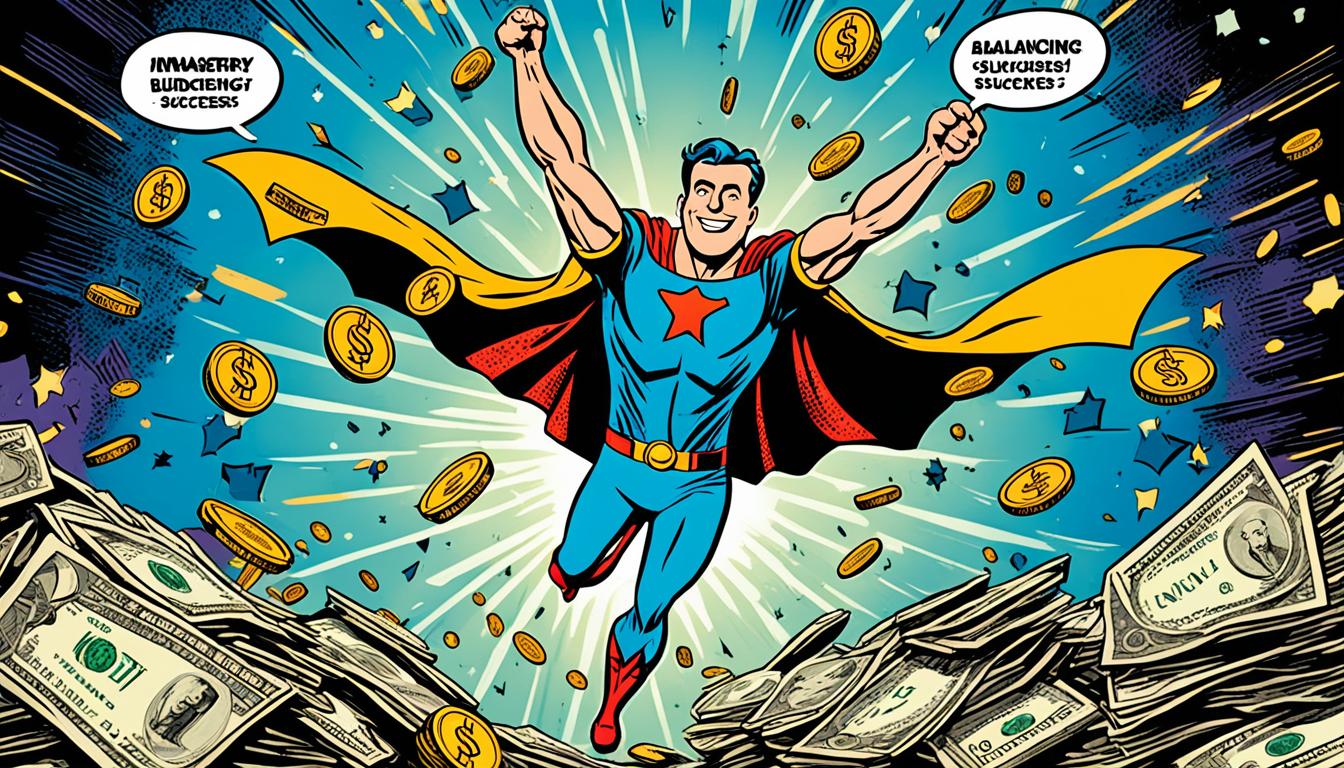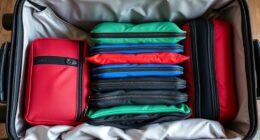80% of Americans are living paycheck to paycheck. This fact shows we need better budgeting to improve our financial future. This article talks about crazy budgeting tricks that really help change your money situation. These tricks make budgeting easier and show you how to manage your cash wisely.
Key Takeaways:
- Discover practical and effective budgeting tricks to revolutionize your finances
- Take control of your money with simplified budgeting strategies
- Learn how to break free from the paycheck-to-paycheck cycle
- Find out how to prioritize your needs and wants within your budget
- Explore the importance of giving and planning for unexpected expenses
The Power of Tracking Every Penny
Tracking every penny you spend is a powerful budget trick. It helps you understand where your money goes. This can be done by either keeping a small notebook or using a budgeting app.
The Benefits of Budget Tracking
Budget tracking lets you:
- Grow your financial awareness. By understanding your spending, you can make smarter money decisions.
- Find areas to save money. You can see where to cut expenses and increase your savings.
- See your progress. Regular tracking shows how your spending changes, motivating you to keep going.
- Make smarter financial choices. Knowing your expenses helps you plan better for purchases and investments.
Choose a Budget Tracking Method That Works for You
Different ways exist to track your spending. It’s crucial to pick one that fits your life. Here are several options:
- Pen and paper: Keep a notebook to jot down expenses. It’s a visual and straightforward way to see your spending.
- Budgeting apps: Apps like Mint and YNAB categorize your expenses digitally. They offer useful insights to guide your decisions.
- Spreadsheets: Tools like Excel or Google Sheets let you tailor a budget. You can analyze your spending in depth.
Pick a method that feels easy and helps you stay on track with your expenses.
| Method | Pros | Cons |
|---|---|---|
| Pen and paper | Simple, tangible, no reliance on technology | Requires manual calculations, easy to lose or forget |
| Budgeting apps | Automated tracking, categorization, and analysis | May require a learning curve, reliant on digital devices |
| Spreadsheets | Customizable, allows for data analysis and visualization | Requires manual input, may be time-consuming |
Find a budgeting method that suits you. Consistency and accuracy are crucial for tracking success.
The $20 Weekly Challenge
Want to get better at handling your money? Try the $20 weekly challenge. You only spend $20 each week, watching your extra expenses closely. It helps you think carefully about how you use your money.
This challenge makes you stop and think before buying on impulse. You learn to spend only on what matters most to you. Be it lunches or small treats, you have to plan because of your budget.
Sticking to $20 shows you how far you can stretch a small budget. It’s not about giving things up. Instead, it’s about choosing wisely and being disciplined with your funds.
What if you don’t spend all your $20? You can save it or use it for something big, like paying off a loan or saving for emergencies.
The $20 challenge is about growing personally and getting better with money. It teaches you to watch where every dollar goes. You feel more in control of your finances.
Benefits of the $20 Weekly Challenge
Trying the $20 weekly challenge can really help you manage your money better. Here’s how it helps:
- Budget control: A weekly cap means you watch your spending to avoid going over budget.
- Improved financial discipline: It trains you to stick to a set amount, cutting down on random buys.
- Increased savings: Money not spent each week goes into savings, building them up quicker.
- Prioritization of expenses: With limited cash, you choose carefully what you spend on, focusing on what’s important.
- Mindful spending: It encourages you to think about each purchase, making more deliberate choices.
Excited to try the $20 weekly challenge? Start now and watch how it changes your financial life for the better.
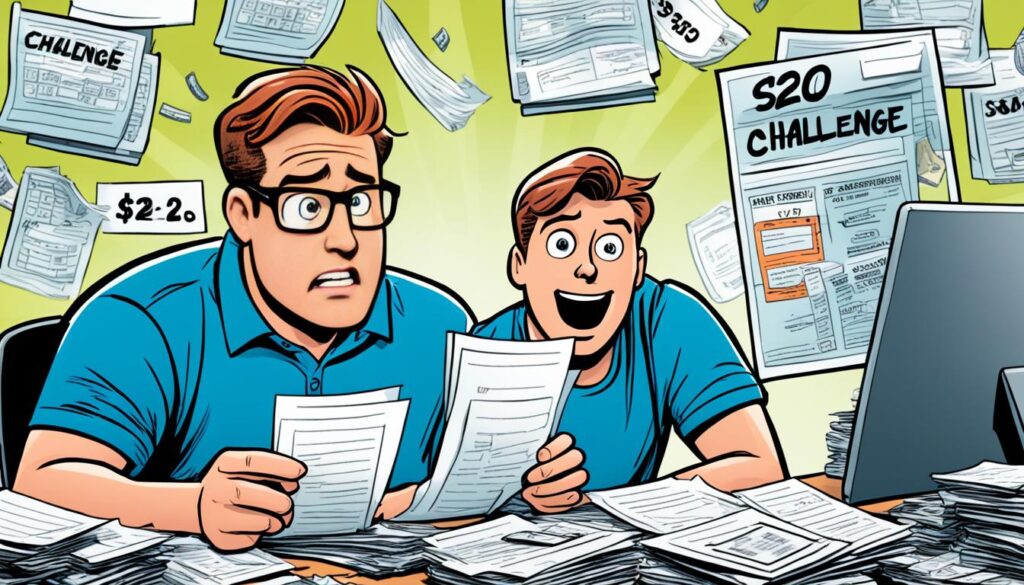
Budgeting for Your Needs and Wants
Understanding the difference between needs and wants is key to managing your money well. By focusing on what’s essential, you can make a budget that matches your goals. This lets you control your spending better.
Needs are necessary for your basic survival and well-being, like food, shelter, healthcare, and transportation. Spending on these needs is crucial. It helps you live a stable life.
Wants, however, are things that make life enjoyable but aren’t essential, such as movies, eating out, trips, and fancy items. While they add joy, it’s important to keep their costs in check.
First, figure out what you absolutely need to spend money on. Make sure you have enough to cover these basics. This is the foundation of a stable financial life. Then, think about spending on your wants.
Prioritize your needs to make sure your important expenses are covered first. This helps prevent overspending on unnecessary items. It’s a balance between needs and wants without hurting your finances.
Budgeting isn’t set in stone. It’s important to frequently check and adjust your budget. Keep your financial goals in mind and change your budget as your situation changes.
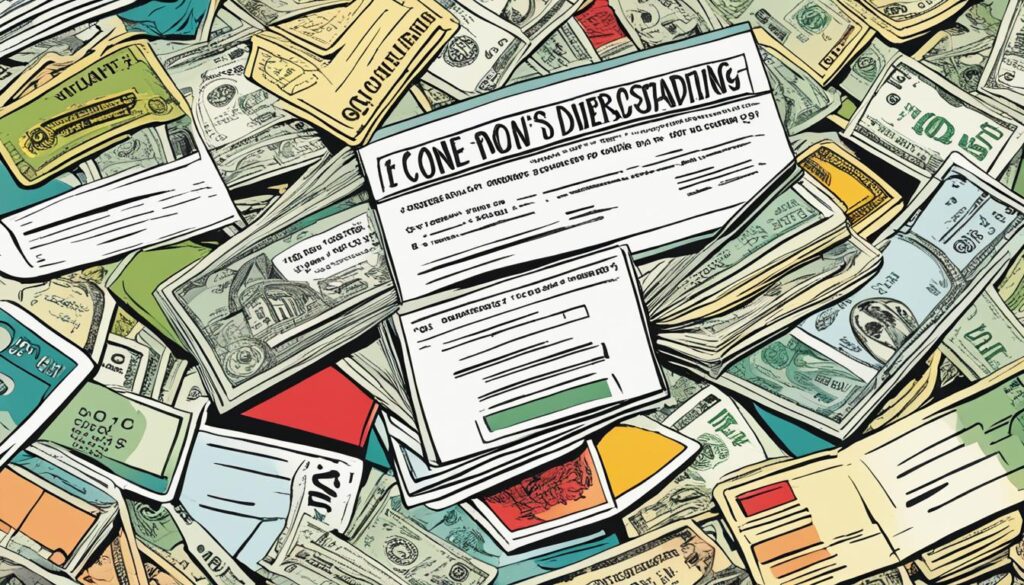
| Needs | Wants |
|---|---|
| Food | Entertainment |
| Shelter | Dining out |
| Transportation | Vacations |
| Healthcare | Luxury goods |
Pay Yourself First
Saving should be at the top of your budget list. Start by setting aside some of your paycheck for savings. This can be for emergencies, retirement, or other goals. This approach helps you build a financial cushion and prepare for any surprises or future needs.
| Benefits of Paying Yourself First | How to Implement It |
|---|---|
|
|
Taking charge of your financial future starts with paying yourself first. Save regularly to reach your dreams and build a solid financial base. Building an emergency fund keeps you safe in hard times. Saving for retirement ensures your future. Start saving now to enjoy financial stability and peace of mind later.
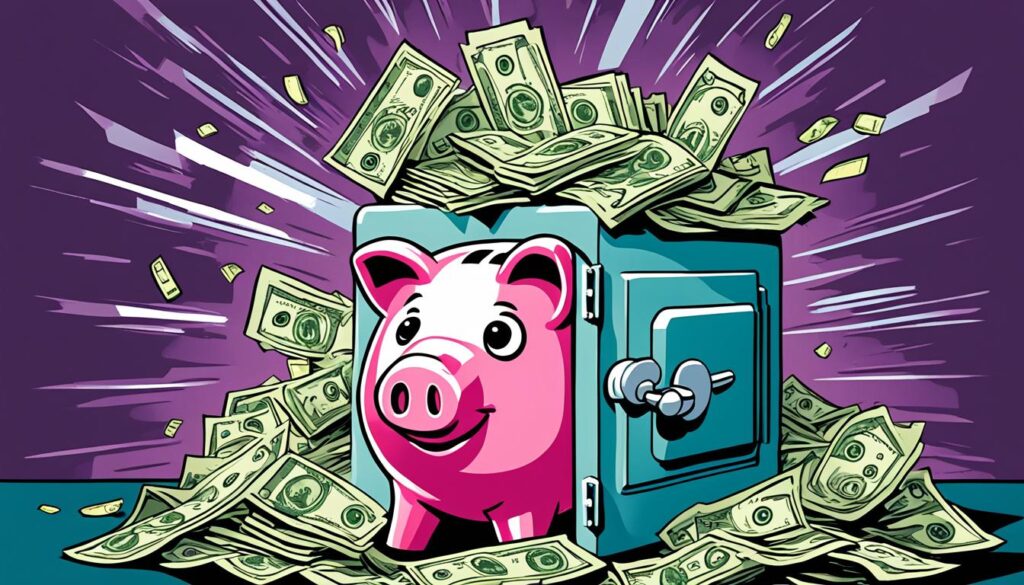
The Importance of Giving
Adding charity to your budget does more than help those in need. It grows gratitude and a feeling of plenty. Being generous is key to a rewarding life.
Giving to charity lets you touch the world positively and back causes you care about. It aids not just those you help, but you too.
Giving brings happiness through helping others and spreads goodness. Donating money, volunteering, or helping raise funds all count. Every bit helps.
“No one has ever become poor by giving.” – Anne Frank
There are practical gains to giving too. It can cut your taxes and make budgeting better. When you donate, you save money for doing good.
Start giving a little, then maybe give more when you can. Regular donations show you’re serious about helping and value generosity.
The Impact of Charitable Giving
Studies find that people who donate are happier and more satisfied with life. Giving lowers stress, betters mental health, and brings purpose.
- It makes us thankful and mindful of our own riches.
- It tightens community bonds and friendships.
- Being generous encourages others to do the same, creating a cycle of kindness.
Donating part of your budget betters your finances and life. Discover the happiness giving brings and how it leads to personal freedom.

Planning for Unexpected Expenses
Unexpected costs can upset your financial plans, leading to stress. Planning ahead can keep your finances safe. Emergency funds and flexible budgeting help you stay on track, even when surprises happen.
Creating an Emergency Fund
An emergency fund is your safety net for life’s unexpected moments. Start by saving three to six months’ worth of expenses. Adding regularly to this fund is like paying a crucial bill. It might mean cutting back in other areas, but the security it provides is worth it.
Budgeting for Surprises
Adding a surprise expense category to your budget is wise. Think about what unexpected bills could pop up, like for home or car repairs or medical costs. Save a bit from each paycheck to cover these. This way, you’re never caught off guard.
Maintaining Financial Flexibility
Keeping your finances flexible is vital. Don’t lock all your money in hard-to-sell assets. A mix of short-term and long-term investments means you can access cash when needed. This balance keeps you ready for surprises without hurting your financial growth.
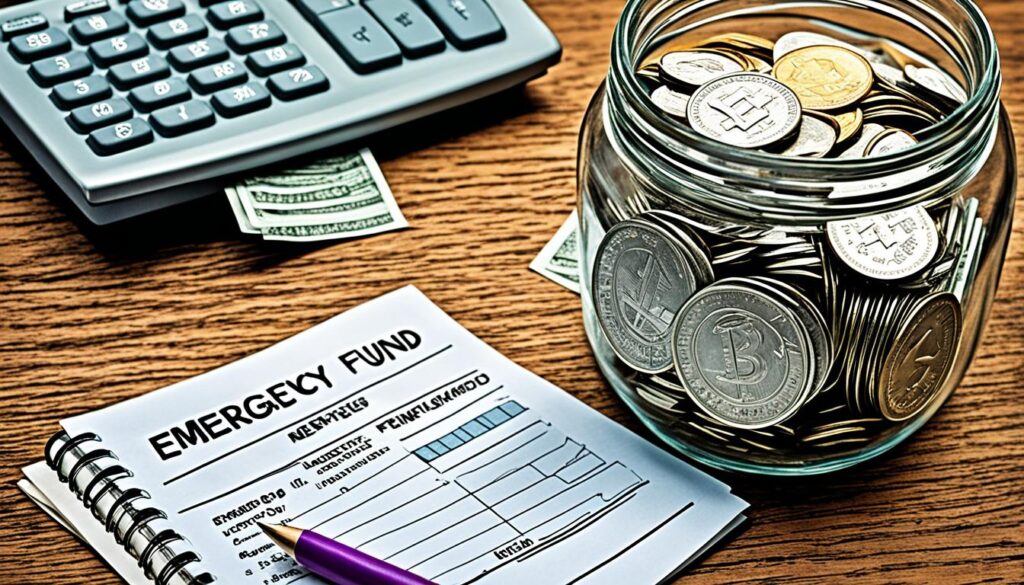
The Importance of Preparedness
Being ready for the unexpected keeps you financially healthy. It means you won’t need to borrow to handle surprises, keeping debt away. An emergency fund and smart budgeting build confidence and control over your money. You can face unexpected bills without harming your future finances.
| Benefits of Planning for Unexpected Expenses | Tips for Creating an Emergency Fund | Strategies for Budgeting for Surprises |
|---|---|---|
| 1. Provides financial security and peace of mind 2. Prevents reliance on credit cards or loans 3. Maintains progress towards long-term goals |
1. Set a specific savings goal 2. Treat contributions as necessary expenses 3. Regularly review and adjust your target amount |
1. Estimate potential costs of unexpected expenses 2. Allocate a portion of your income towards surprises 3. Be proactive in setting aside funds for unforeseen events |
Planning for surprises means confidence and financial freedom. Embrace preparedness and take control of your finances today.
Choosing the Right Budgeting Tool
Finding the right tool for budgeting is key. You might like budgeting apps, Excel sheets, or the envelope system. It’s important to pick a method that matches your financial goals and personal likes.
Budgeting apps are easy and handy for keeping track of expenses and managing your budget anywhere. These apps offer features such as sorting expenses, setting goals, and syncing across devices. This makes it easy to keep organized and watch your money grow. Popular apps include Mint, YNAB (You Need a Budget), and Personal Capital.
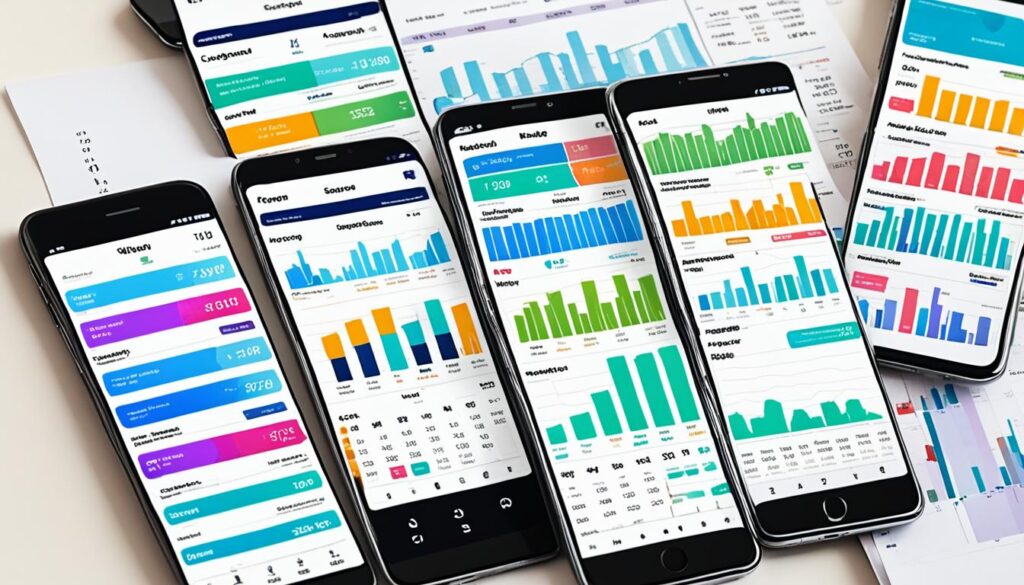
If you like a more old-school method, Excel spreadsheets are a good choice. They’re flexible and you can customize them for your needs. Using Excel means more manual work but gives you more control over your budget.
The envelope system is perfect for those who want a physical way to see their budget. You put cash for different spending areas into labeled envelopes. It shows clearly how much you have to spend, helping to avoid overspending. It takes more work to manage cash in envelopes, but it’s helpful for those who prefer to see and touch their budget.
It’s smart to try various tools and methods to see what’s best for you. Some might like a mix of apps and Excel, while others might prefer the simplicity of envelopes. The best budgeting tool is the one that helps you manage your money well, meet your financial goals, and feel in control of your spending.
Making Budgeting a Lifestyle
Making budgeting a part of every day is key to long-term financial success. It helps you manage your money well into the future.
Being consistent with your budget is like maintaining any other habit. Think of it as important as daily teeth brushing or exercising. Every month, take time to check and adjust your budget. This lets you see how you’re doing and find ways to improve.
Think about your big financial goals. What are you aiming for? Saving for retirement, buying a house, or maybe starting your own business. Budgeting regularly will guide you to your dreams.
Having a budget means you understand your money better. You’ll know exactly how much you make, spend, and save. This clarity leads to smarter money choices and helps you focus on your aims.
Tracking Your Expenses
Knowing where every cent goes is a big part of budgeting. Recording your expenses shows you your spending habits. You can see where you might be using too much money and adjust.
Keeping an eye on your spending makes you think more about your choices. It teaches you to tell apart needs from wants. You can then spend wisely on what truly matters to you.
There are many budgeting tools and apps to help track your money. They sort your expenses and save you the hassle of doing it by hand. They offer easy ways to see your spending patterns and find areas to improve.
Embracing a Frugal Mindset
Being frugal is smart for long-lasting financial health. It’s not about missing out. It’s about choosing wisely and living by your values.
Frugality makes you thoughtful about spending. It inspires creativity in using what you have and enjoying low-cost alternatives.
Combining a budgeting habit with a frugal way of life is powerful. It’s about being mindful with your money and always considering your long-term wishes.
Living a budget-friendly life makes a big difference. You’ll feel more in charge of your finances, ready for surprises, and on track for your future goals.
To wrap up, for lasting riches:
* Blend budgeting into your day-to-day life.
* Regularly revisit your budget to stay up-to-date.
* Watch your spending to ensure smart purchasing decisions.
* Pick frugality to value and make the most of every dollar.
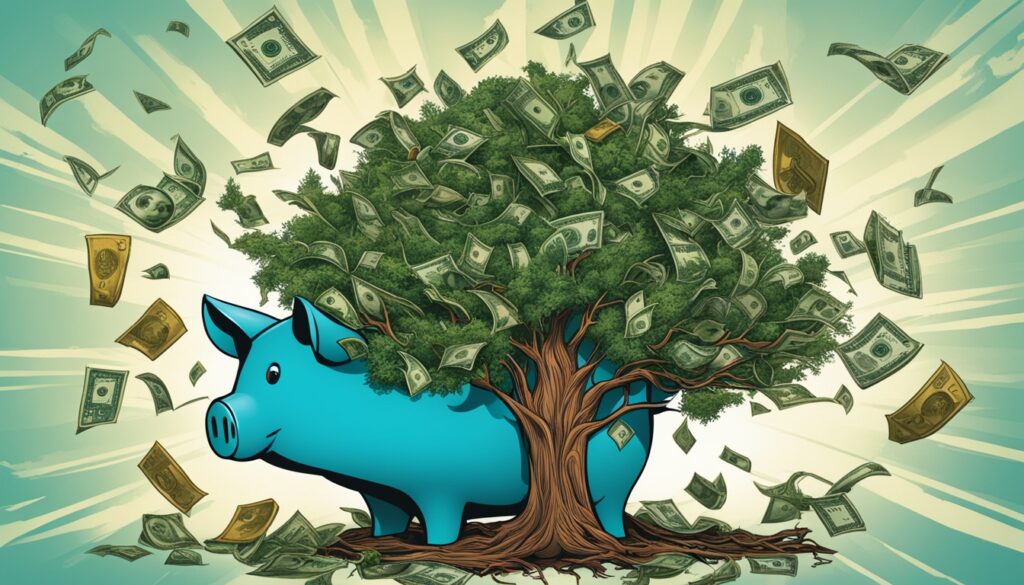
Using Budgeting to Achieve Financial Freedom
Budgeting is a powerful way to reach financial freedom. It lets you control your finances, cut debt, and grow wealth. You’ll be able to manage your money wisely by following a budget. This means making smart choices on how to spend and save your money.
Financial freedom is our main aim when budgeting. It’s about having enough money to make life choices freely. Imagine living life on your own terms, without worrying about money. That’s what financial freedom looks like.
Reducing debt is a big part of gaining financial freedom. By tracking spending and saving, you can identify where to cut costs. Prioritizing debt repayment helps too. With a budget, you’ll see where your money should go to wipe out debt.
Building wealth is also crucial for financial freedom. Set aside some money from what you earn for savings and investing. Keep an eye on your goals to build a strong financial base. This will help secure your future financially.
Starting to budget for financial freedom begins with setting financial goals. Think about what financial freedom means to you. Set realistic goals that match your dreams. Goals give you something to aim for on your budgeting journey.
Your budget should focus on paying off debt and saving money. List your debts and their interest rates. Then put some of your income towards reducing these debts. You might have to cut back in some areas, but it’s worth it.
Choosing what you buy carefully can save you money. Think about each purchase and if it really adds value to your life. This avoids impulse buys and saves money for more important things like paying off debt and saving.
Keeping track of how you spend money is important. Use apps or spreadsheets to record your income and expenses. This helps you find where you might be spending too much. Then you can adjust your budget to meet your financial goals better.
Being flexible with your budget is essential. Sometimes, unexpected costs come up, like car repairs. Having an emergency fund helps with these surprises. Save a little each month for emergencies to keep your budget stable.
Don’t forget to update your budget as things change. Your income and expenses will vary over time. Adjust your budget to match these changes. This makes sure your budget keeps helping you reach your financial goals.

| Steps | Description |
|---|---|
| 1. Set Financial Goals | Determine your financial goals and objectives for long-term financial freedom. |
| 2. Track Income and Expenses | Record and categorize your income and expenses to gain insights into your spending habits. |
| 3. Allocate Funds for Debt Reduction | Allocate a portion of your income towards debt repayment to gradually reduce your debts. |
| 4. Prioritize Savings | Set aside a portion of your income for savings and investments to build wealth over time. |
| 5. Maintain an Emergency Fund | Establish an emergency fund to cover unexpected expenses and protect your budget. |
| 6. Review and Adjust | Regularly review and adjust your budget to accommodate changes in income, expenses, and goals. |
Achieving financial freedom with budgeting is a step-by-step process. It takes discipline, effort, and time. But as you stick with it, you’ll start to see good changes in your finances. Start now and take steps towards your financial goals. Your future self will thank you!
Embracing the Joy of Frugality
Frugality isn’t about giving up happiness or your favorite things. It’s about being wise with your money, choosing carefully, and being happy living with what you have. By being frugal, spending wisely, and choosing consciously, you can feel content. This lifestyle leads to a more rewarding and financially stable life.
Frugal living doesn’t mean giving up all you love. It’s about knowing what makes you really happy and spending on that. Being mindful about what you buy means thinking about its value and effect on your life. It’s choosing things that reflect your values and dreams, not just buying what’s trendy.
Being a conscious shopper is part of living frugally and spending wisely. It means knowing how your buys affect society, the planet, and ethics. By choosing to support ethical companies, you do good. At the same time, you stick to your frugal ways.
Frugality is key to financial freedom. It’s about purposeful choices for a meaningful life without overspending.
Frugality doesn’t stop you from occasionally indulging. It’s about making those indulgences count and finding joy in simple pleasures. Instead of spending too much for quick happiness, enjoy working towards your financial dreams.
Living frugally means valuing experiences and connections more than stuff. This lifestyle helps you escape the trap of buying more and more. You discover what’s truly important to you.
Begin by looking at how you spend your money to see where you can save. Reduce costs and find fun that doesn’t cost a lot. Look for activities that are cheap or free, buy secondhand, and consume mindfully.
The true joy in frugality is the freedom and peace you get from spending wisely and choosing how you live. Embrace this lifestyle, spend with care, and support ethical shopping to build a joyful, responsible life.
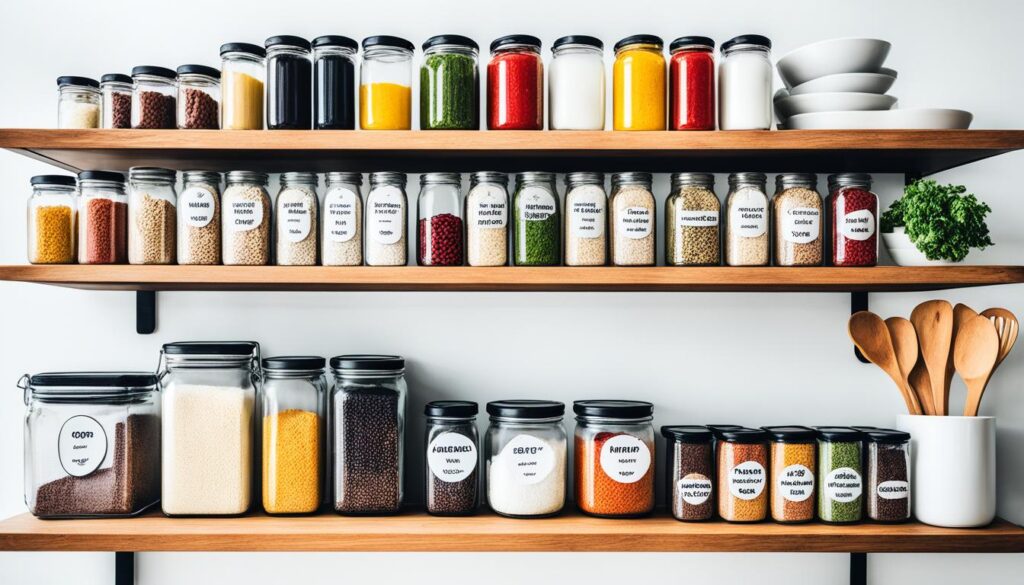
Conclusion
These budgeting tips are not just smart; they’re revolutionary for your money. Tracking every penny shows where you can save. The $20 weekly challenge makes saving a regular thing, helping you focus on what’s financially important.
With a clear plan for what you need and want, you decide where your money goes. Paying yourself first means investing in your future for stability. Also, giving to others feels good and enriches your life with gratitude.
Unexpected expenses won’t throw you off if you plan for them. Finding the best budgeting tool keeps things simple and under control. Making budgeting part of life means these tips become second nature for lasting wealth.
Learn to love being frugal. Use these budgeting strategies to change how you save. Start now and see your finances grow.
